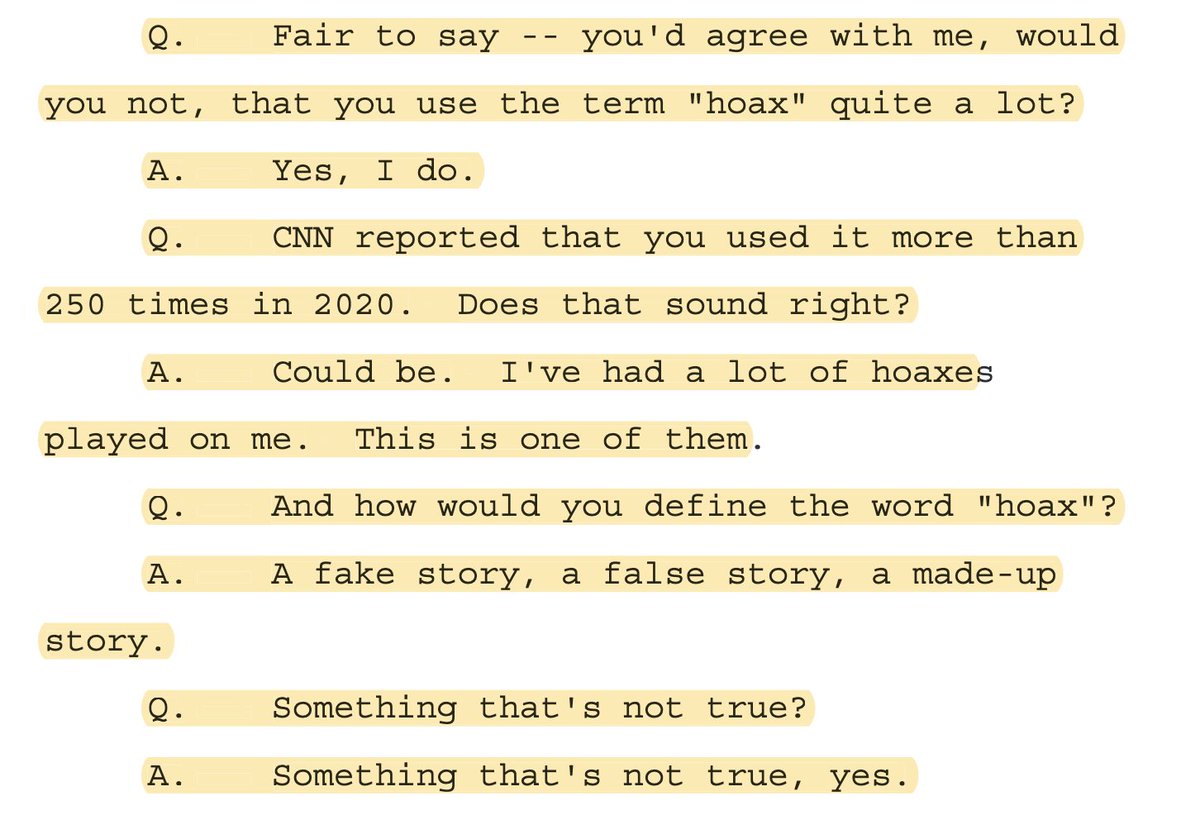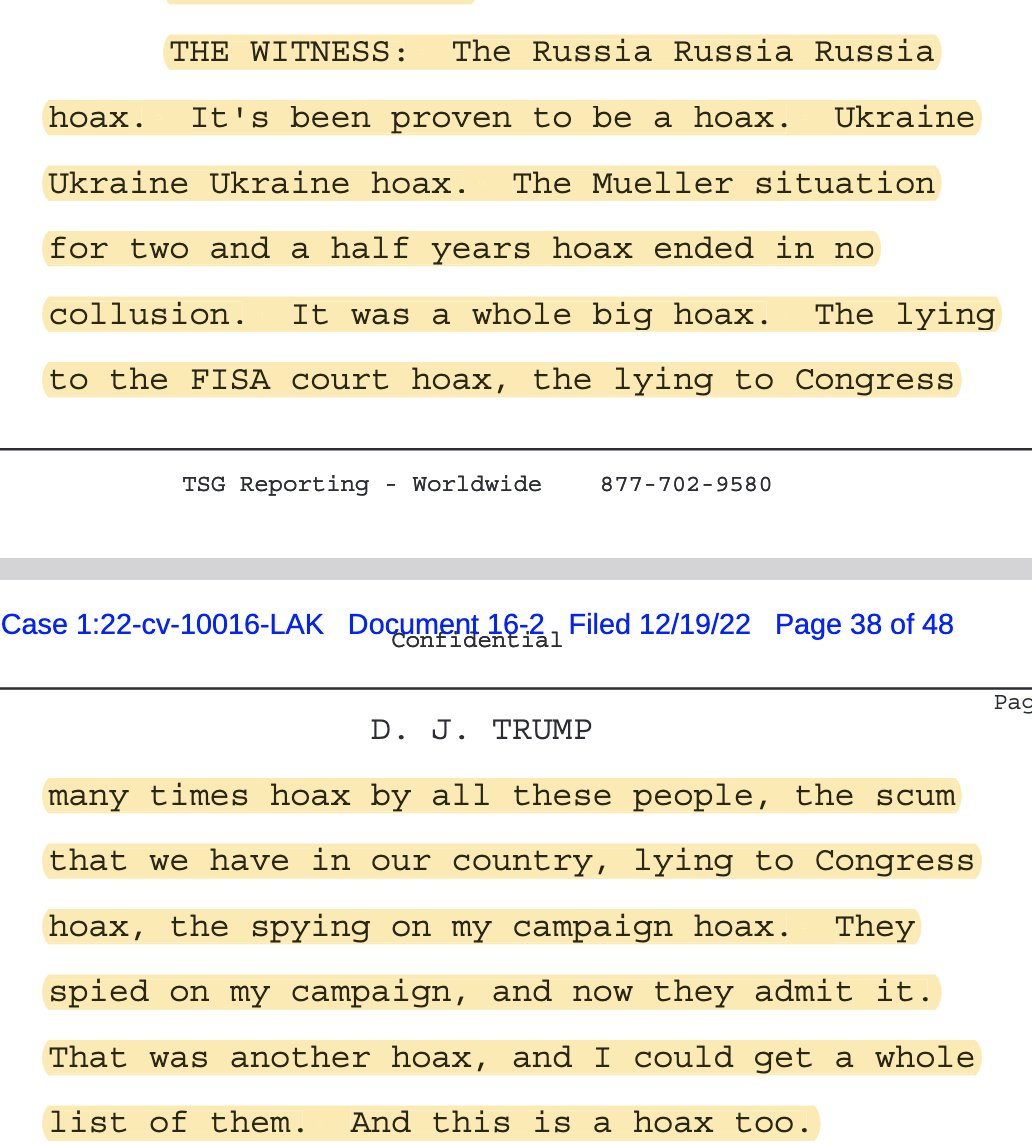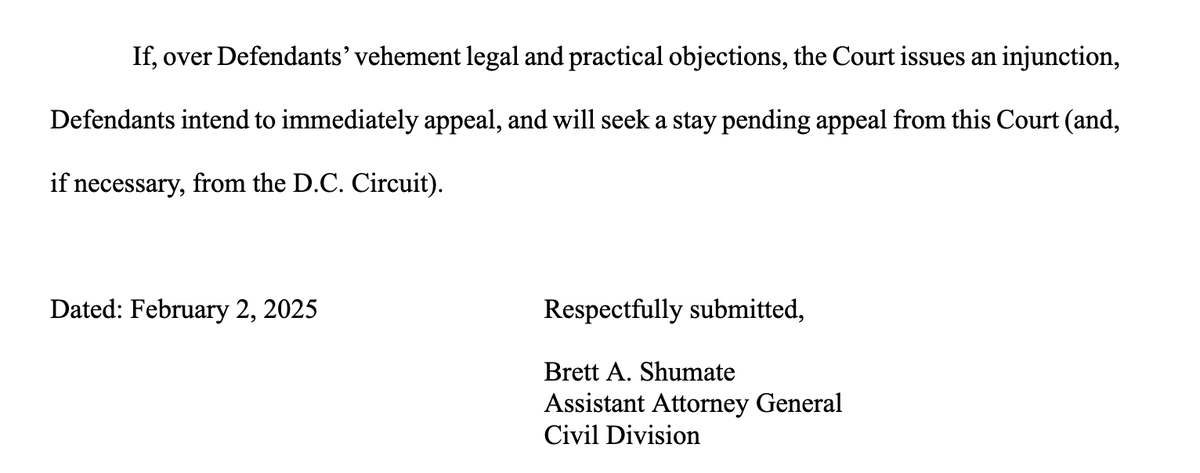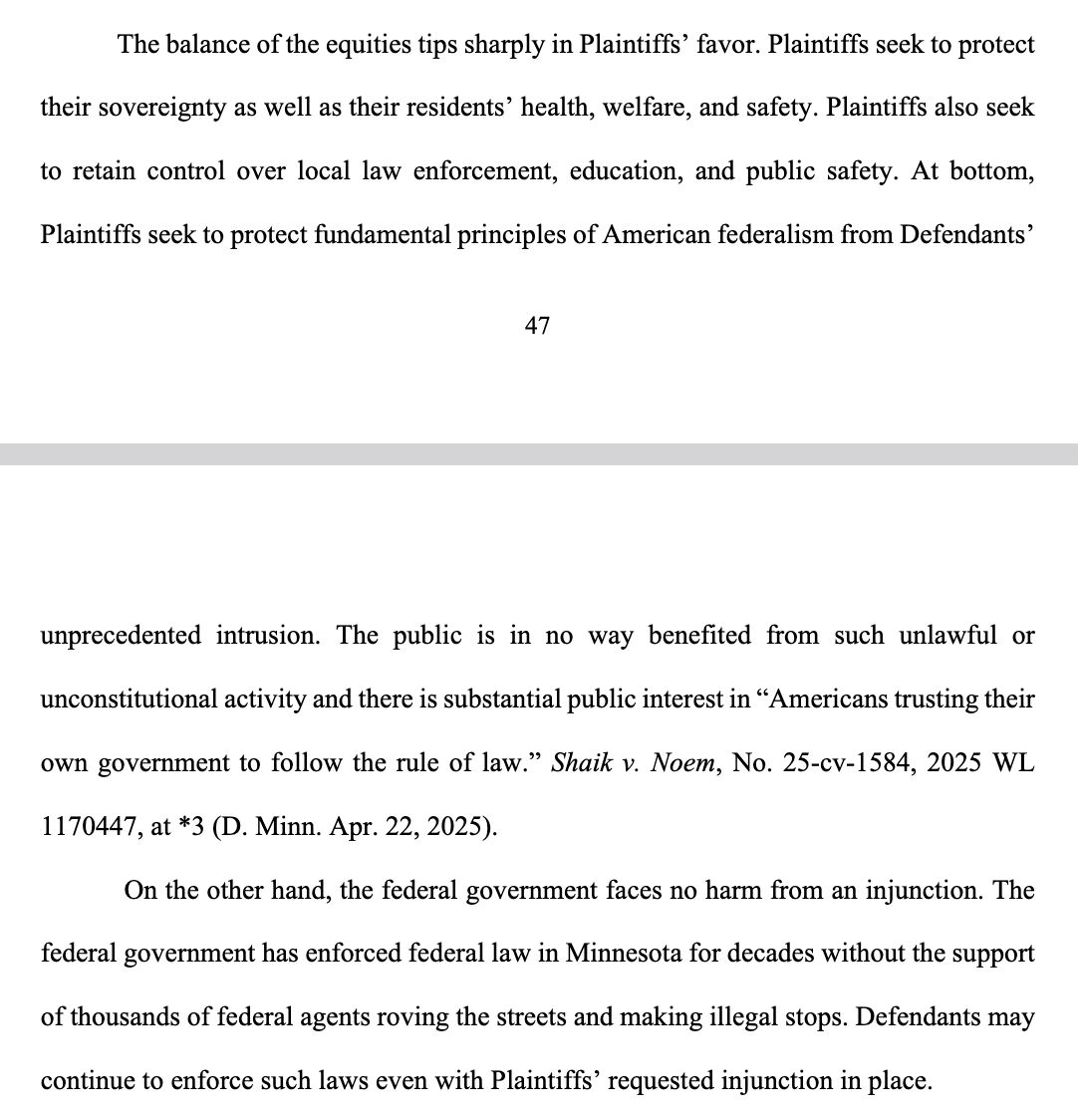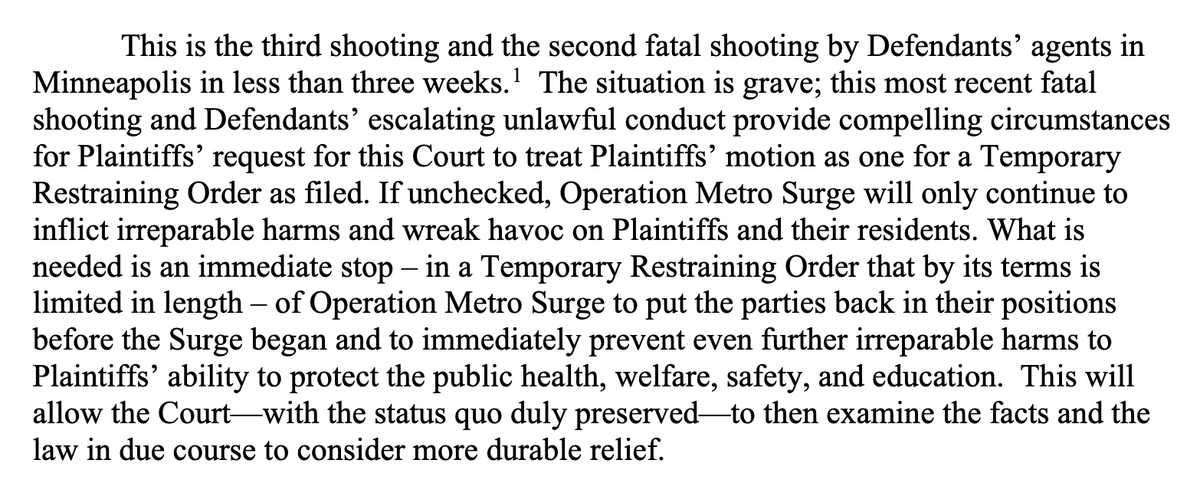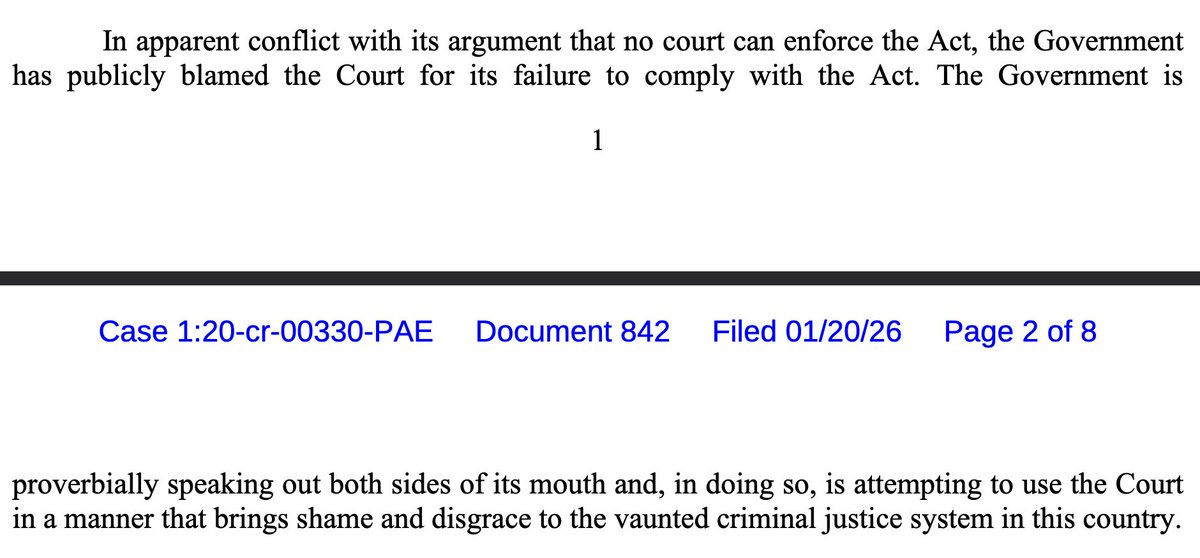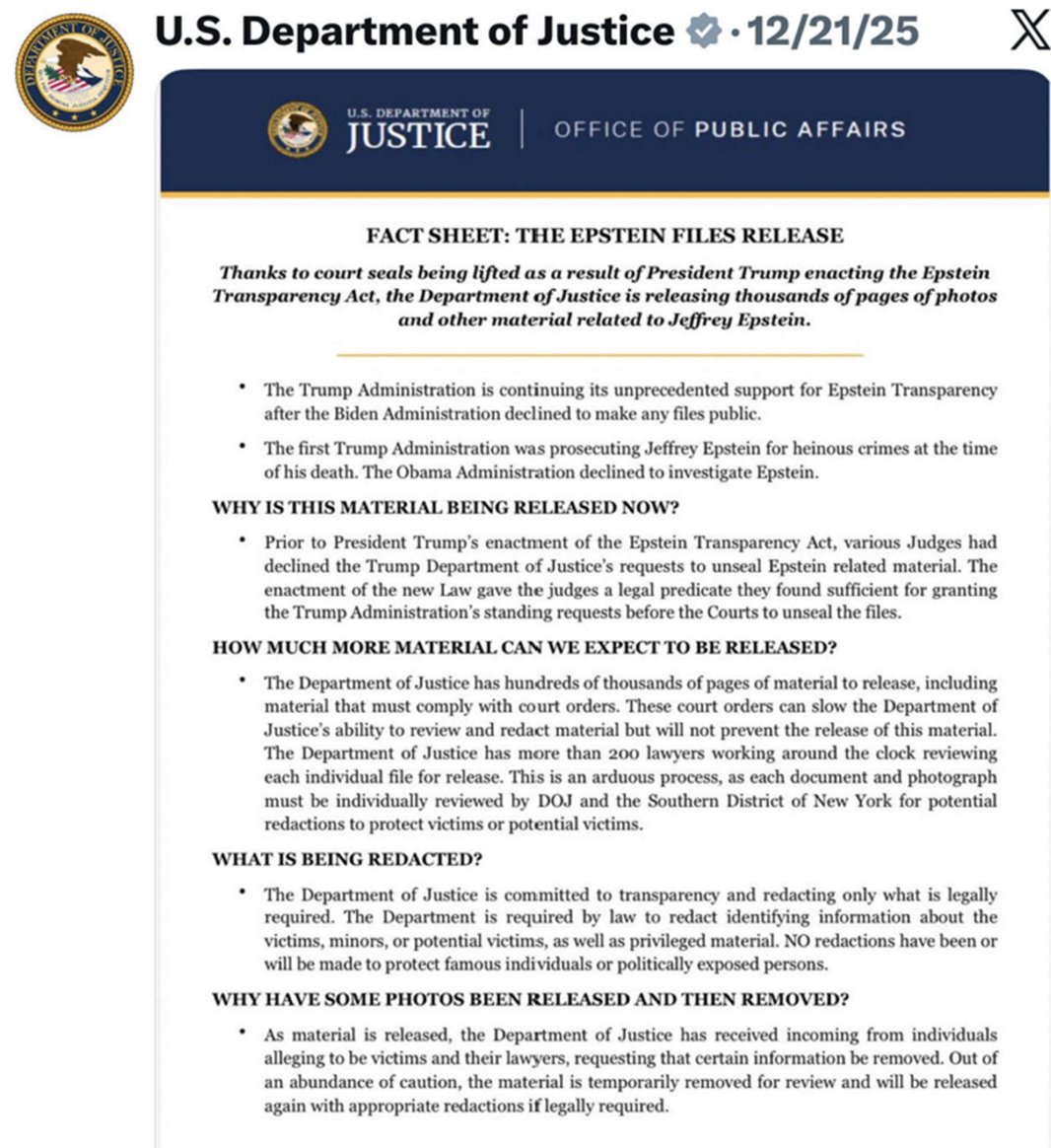Good morning from New York.
This is expected to be the last day of witness testimony in E. Jean Carroll v. Donald Trump. She's planning to rest her case today; he isn't planning to present a defense case.
Follow every wrinkle for the last time until summations, @lawcrimenews.
This is expected to be the last day of witness testimony in E. Jean Carroll v. Donald Trump. She's planning to rest her case today; he isn't planning to present a defense case.
Follow every wrinkle for the last time until summations, @lawcrimenews.
For those who heard Trump's claim that he's going to fly in from Ireland to "confront" Carroll in New York, reporter @molcranenewman sets you straight, via the ex-president's lawyer.
https://twitter.com/KlasfeldReports/status/1654109978754441220?s=20
“And I have a judge who’s extremely hostile,” Trump adds.
One wonders whether this whole presser will come up in court.
One wonders whether this whole presser will come up in court.
https://twitter.com/smurphytv/status/1654061590465990661
The jury enters.
Trump's video deposition resumes.
Trump's video deposition resumes.
The jury is shown the footage of Trump mixing up E. Jean Carroll with his ex-wife Marla Maples in the photo below.
"I don't know who — it's Marla," Trump says.
He adds later: "That's Marla, yeah. That's my wife."
Background, @lawcrimenews: lawandcrime.com/live-trials/e-…
"I don't know who — it's Marla," Trump says.
He adds later: "That's Marla, yeah. That's my wife."
Background, @lawcrimenews: lawandcrime.com/live-trials/e-…
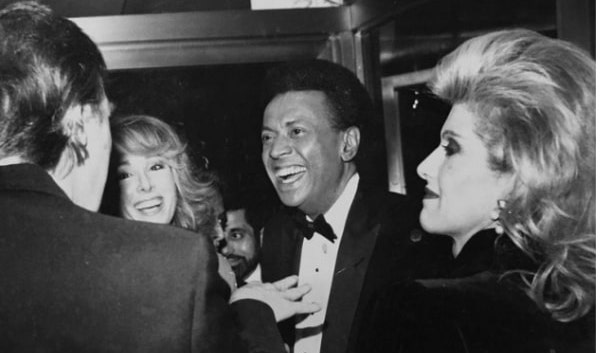
Carroll's lawyer Roberta Kaplan asks him about Trump's comment: "She's not my type," and Trump didn't deny it meaning he didn't find Carroll physically attractive.
Kaplan asks, pointedly: "I take it the three women you married are all your type."
Trump replies in affirmative.
Kaplan asks, pointedly: "I take it the three women you married are all your type."
Trump replies in affirmative.
In the deposition, Trump stands by the Truth Social post that sparked the second defamation claim Carroll fined against him.
"I wrote it all myself, all myself," he said. lawandcrime.com/trump/e-jean-c…
"I wrote it all myself, all myself," he said. lawandcrime.com/trump/e-jean-c…
Trump's asked what he meant by saying Carroll alleged he "swooned" her.
"It's a nicer word than the other word that starts with an F," Trump said.
More on it from the previously-released deposition transcript excerpts. lawandcrime.com/trump/donald-t…
"It's a nicer word than the other word that starts with an F," Trump said.
More on it from the previously-released deposition transcript excerpts. lawandcrime.com/trump/donald-t…
Read the transcript of the video deposition being shown to the jury here. s3.documentcloud.org/documents/2357…
Trump is shown the "Access Hollywood" tape in his deposition.
This makes it the second time the jury's seen it. lawandcrime.com/live-trials/e-…
This makes it the second time the jury's seen it. lawandcrime.com/live-trials/e-…
Trump appears to be expressionless as the video is played in the deposition.
Q: That's you on the video, correct?
A: Yes.
Q: That's you on the video, correct?
A: Yes.
Trump on the "they let you do it" line in the Access Hollywood tape.
"Historically, that's true, with stars."
He adds "if you look over the last million years I guess that's been largely true, not always, but largely true, unfortunately or fortunately."
"Historically, that's true, with stars."
He adds "if you look over the last million years I guess that's been largely true, not always, but largely true, unfortunately or fortunately."
Trump to Carroll's lawyer Roberta Kaplan, in the video deposition:
"You wouldn't be a choice of mine, either, to be honest."
"You wouldn't be a choice of mine, either, to be honest."
Up next:
Carroll's friend Carol Martin, a TV anchor who was one of two women Carroll said she confided in about Trump allegedly raping her.
Background: lawandcrime.com/live-trials/e-…
Carroll's friend Carol Martin, a TV anchor who was one of two women Carroll said she confided in about Trump allegedly raping her.
Background: lawandcrime.com/live-trials/e-…
Martin talks about the America's Talking network, once run by Roger Ailes.
Carroll had a show on that network, "Ask E. Jean."
Martin says they struck up a close friendship during those years, especially from 1994 to 1996.
Carroll had a show on that network, "Ask E. Jean."
Martin says they struck up a close friendship during those years, especially from 1994 to 1996.
Carol Martin recalls E. Jean Carroll telling her.
"You wouldn't believe what happened to me the other night."
"Trump attacked me."
"You wouldn't believe what happened to me the other night."
"Trump attacked me."
Carol Martin:
"I was completely floored. I didn't know what was coming next."
Martin says she asked: "Are you okay?"
"Her affect was anxious and excitable, but she can be that way," she added.
"I was completely floored. I didn't know what was coming next."
Martin says she asked: "Are you okay?"
"Her affect was anxious and excitable, but she can be that way," she added.
Martin recalls it "wasn't a linear conversation."
"She was clearly agitated, anxious," she says, adding that Carroll said she was at Bergdorf's and she ran into Donald Trump.
"My sense was she engaged him [in conversation] or vice versa, b/c that wasn't uncommon for E. Jean."
"She was clearly agitated, anxious," she says, adding that Carroll said she was at Bergdorf's and she ran into Donald Trump.
"My sense was she engaged him [in conversation] or vice versa, b/c that wasn't uncommon for E. Jean."
Martin:
"She didn't use the word 'rape' as I recall."
Carroll used the word "fighting."
"She didn't use the word 'rape' as I recall."
Carroll used the word "fighting."
Writer Lisa Birnbach, the first woman Carroll says she told, testified that Carroll described a "rape" but didn't want to use that word.
Carroll preferred to use the word fighting. lawandcrime.com/live-trials/e-…
Carroll preferred to use the word fighting. lawandcrime.com/live-trials/e-…
Q: Was she crying?
A: No, she was not.
Q: Was she visibly upset?
A: Yes, she was.
A: No, she was not.
Q: Was she visibly upset?
A: Yes, she was.
Martin says she told Carroll that Trump had a lot of attorneys and he would "bury" her.
"I'm not proud that that's what I told her, in truth."
Carroll testified about Martin making the "bury" comment earlier in the trial.
"I'm not proud that that's what I told her, in truth."
Carroll testified about Martin making the "bury" comment earlier in the trial.
Questioning turns to Carroll deciding to step forward in 2019, during Trump's presidency.
Martin testifies about her qualms about being identified as one of the women Carroll said she told.
"I had a real worry about the climate of the country, and I was not sure I wanted to be associated with something so difficult to talk about."
"I had a real worry about the climate of the country, and I was not sure I wanted to be associated with something so difficult to talk about."
Q: Were you concerned about security issues?
A: I was.
Asked if she talked to Carroll about it, she replies: "I did."
A: I was.
Asked if she talked to Carroll about it, she replies: "I did."
Martin said the excerpt of Carroll's book went to the "crucible" of women's issues being aired at the time during the #MeToo movement.
Q: Sitting here today, do you like Donald Trump?
A: Not particularly.
Speaking for her reaction to Trump's election in 2016, Martin said: "I used the word devastated and still feel that way."
A: Not particularly.
Speaking for her reaction to Trump's election in 2016, Martin said: "I used the word devastated and still feel that way."
Q: Are you testifying in this case because of your negative views about Donald Trump?
A: No. No, I am not.
A: No. No, I am not.
Martin on the difficulties of backing up Carroll's account:
"It was difficult because people in my family were concerned about identification."
She said she wasn't happy about having to turn over texts from her phone and giving a deposition.
"It was difficult because people in my family were concerned about identification."
She said she wasn't happy about having to turn over texts from her phone and giving a deposition.
Trump's attorneys frequently invoke a 2017 email chain between E. Jean Carroll and Carol Martin, where Martin used the word "scheme."
Martin testifies that the email refers to discussing issues important to them.
Martin testifies that the email refers to discussing issues important to them.
Martin says that she is testifying voluntarily, but she wasn't looking forward to it.
Asked why she's on the stand, Martin says: "I’m here to reiterate and remember what my friend E. Jean Carroll told me” in the mid-1990s.
“I believed it then, and I believe it today.”
Asked why she's on the stand, Martin says: "I’m here to reiterate and remember what my friend E. Jean Carroll told me” in the mid-1990s.
“I believed it then, and I believe it today.”
Tacopina objects to the final line about Martin believing her friend Carroll.
Judge Kaplan sustains — but only as to what Martin believes today.
Judge Kaplan sustains — but only as to what Martin believes today.
Reporter @vicbekiempis noted in court that the parties haven't disclosed Trump's video deposition publicly. She has been pushing for access, along with numerous news outlets in the in-house press corps.
We at @lawcrimenews are among that group.
We at @lawcrimenews are among that group.
(Thanks @vicbekiempis for taking the lead.)
Judge Kaplan told her to provide a copy of the letter to the lawyers.
Judge Kaplan told her to provide a copy of the letter to the lawyers.
Now, back to the trial:
Proceedings resume with Trump's lawyer Joe Tacopina's cross-ex of Carol Martin.
Proceedings resume with Trump's lawyer Joe Tacopina's cross-ex of Carol Martin.
Joe Tacopina asks, in a heavily incredulous voice, about Martin next talking to Carroll about her rape claims decades later.
Objection.
Sustained.
Judge Kaplan then, in a deadpan voice, recites to him the Black's Law Dictionary definition of an argumentative question.
Objection.
Sustained.
Judge Kaplan then, in a deadpan voice, recites to him the Black's Law Dictionary definition of an argumentative question.
Judge Kaplan prefaced his remark with "Counselor, for your information," before reciting the entry as "a question in which the examiner interposes a viewpoint in the guise of asking a question."
Tacopina presses Martin on a comment she made that Carroll's "quest" had become a "lifestyle."
Martin says that she was "hyperbolic."
Martin says that she was "hyperbolic."
Martin says it doesn't mean what Tacopina is "implying."
Tacopina said that he isn't implying anything, just asking a question.
Tacopina said that he isn't implying anything, just asking a question.
Tacopina says that Martin remarked in a text to her daughter that Carroll was "loving the adulation."
"We are all her cheerleaders," Martin acknowledges she wrote in the text.
"We are all her cheerleaders," Martin acknowledges she wrote in the text.
The text goes on that Carroll was "in too deep" and Martin was just "not there for it."
Lunch recess.
Before his “grab them by the p—-” remark on “Access Hollywood," Donald Trump told Billy Bush: “When you’re a star, they let you do it.” Trump doubled-down on that line during his deposition.
“Historically, that’s true, with stars,” Trump said.
Recap lawandcrime.com/live-trials/e-…
“Historically, that’s true, with stars,” Trump said.
Recap lawandcrime.com/live-trials/e-…
Trial resumes and cross-ex continues:
Tacopina refers to a party with various notables, including (his mispronunciation) Preet "Bharaha" [sic].
Tacopina refers to a party with various notables, including (his mispronunciation) Preet "Bharaha" [sic].
Tacopina asks whether Martin ever discussed Carroll's rape claims around election time.
Q: You didn't say a word that Donald Trump supposedly raped your friend?
A: I don't recall ever saying that.
Q: You didn't say a word that Donald Trump supposedly raped your friend?
A: I don't recall ever saying that.
Roberta Kaplan asks Martin if she recalls her "venting" to her daughter about E. Jean Carroll's case.
Martin says she recalls it.
(Tacopina highlighted Martin's texts about Carroll turning her claims against Trump into a "lifestyle" and basking in the "adulation" on cross.)
Martin says she recalls it.
(Tacopina highlighted Martin's texts about Carroll turning her claims against Trump into a "lifestyle" and basking in the "adulation" on cross.)
Kaplan asks Martin about her deposition testimony about that.
Martin was quoted saying in that deposition that the litigation was "dragging on too long."
"I was thinking that perhaps things wouldn't turn out as well as we would hope."
Martin was quoted saying in that deposition that the litigation was "dragging on too long."
"I was thinking that perhaps things wouldn't turn out as well as we would hope."
Martin didn't, however, doubt Carroll's claims, she said.
Robbie Kaplan repeatedly refers to the texts as "venting," and asks about their contents.
Q: You used words like "scary"?
A: Yes.
Q: You used words like "I don't relate"?
A: Yes.
Q: You used words like "scary"?
A: Yes.
Q: You used words like "I don't relate"?
A: Yes.
Robbie Kaplan quotes Martin saying in one chat that she doesn't know how the "F" all of this is happening from "a simple chat 25 years ago."
Martin agrees she wrote that, and says she was referring to Carroll's disclosure of Trump allegedly raping her.
Martin agrees she wrote that, and says she was referring to Carroll's disclosure of Trump allegedly raping her.
Kaplan ends redirect about whether Martin "wanted to stop the train," meaning the Trump train.
Martin acknowledges he did.
Q: Would you be willing to lie to stop the Trump train?
A: No, I would not.
Asked whether she'd commit perjury, Martin answers: "No, I would not."
Martin acknowledges he did.
Q: Would you be willing to lie to stop the Trump train?
A: No, I would not.
Asked whether she'd commit perjury, Martin answers: "No, I would not."
Robbie Kaplan reiterates a variation of the perjury question as her last line.
Martin replies: "Under no circumstances. No, I would not."
Martin replies: "Under no circumstances. No, I would not."
Brief recross by Tacopina:
In the text messages, did Martin ever refer to Trump as a rapist, he asks.
She says she doesn't think she did.
In the text messages, did Martin ever refer to Trump as a rapist, he asks.
She says she doesn't think she did.
Next witness:
Professor Ashley Humphreys, their expert from Northwestern's Medill journalism school, whose skill set would be useful for calculating defamation damages.
(That issue still hasn't been quantified at trial — yet.)
Professor Ashley Humphreys, their expert from Northwestern's Medill journalism school, whose skill set would be useful for calculating defamation damages.
(That issue still hasn't been quantified at trial — yet.)
Humphreys calculates how many times Trump's Truth Social post attacking E. Jean Carroll had been seen online.
She counted 5.1 million website impressions.
She moves onto social media impressions.
She counted 5.1 million website impressions.
She moves onto social media impressions.
• • •
Missing some Tweet in this thread? You can try to
force a refresh

